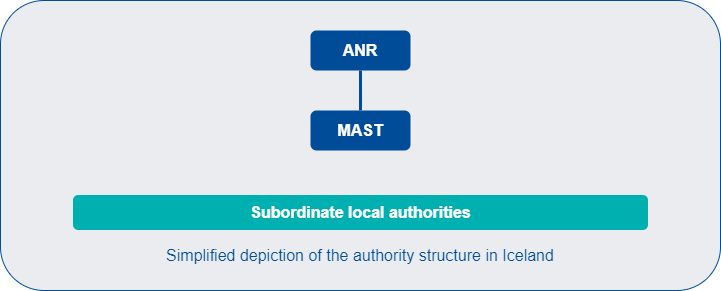Please support the World Food Safety Almanac by participating in our 1-minute reader survey.
Difference between revisions of "Iceland:Iceland"
Lindenlaub (talk | contribs) |
|||
| Line 1: | Line 1: | ||
{{#drawio:Iceland|max-width=650px}} | {{#drawio:Iceland|max-width=650px}} | ||
''© worldfoodsafetyalmanac.bfr.berlin'' | |||
Revision as of 11:45, 23 September 2021
© worldfoodsafetyalmanac.bfr.berlin
The Food Act is the central legal foundation for food legislation in Iceland. Infringement of food regulations can lead to measures under criminal law and consumer damage claims under civil law, whereby the final decision rests with the courts. Government measures with regard to food safety are often based on scientific risk assessments. However, the final decision on the legality of governmental measures rests with the courts.
Risk assessment and risk management are partly separated. Risk assessments are conducted by a risk assessment committee and by Matís Ltd. (Icelandic Food and Biotech R&D). The risk assessment committee reports to the Ministry of Industry and Innovation. The role of the committee is to provide scientific risk assessments in the areas of food, feed, fertilizers, and seed products. The Minister of Fisheries and Agriculture and the Food and Veterinary Authority may request the opinion of the committee. The committee may also, on its own initiative, carry out a risk assessment in consultation with the Minister of Fisheries and Agriculture.
Risk management decisions are made by the Ministry of Industries and Innovation and the Food and Veterinary Authority. Risk assessments from EFSA or national risk assessment authorities are sometimes used. Risk assessments connected to animal welfare are conducted by the Food and Veterinary Authority.
Ministry of Industries and Innovation
| Name | Ministry of Industries and Innovation |
|---|---|
| Acronym | ANR |
| Activities |
|
| Responsibilities | |
| Location | Reykjavík |
| URL | https://eng.atvinnuvegaraduneyti.is |
The Ministry of Industries and Innovation (ANR) is responsible for fisheries and agricultural policy and food safety in Iceland.
Risk assessment comity is under the responsibility of ANR.
The ministry prepares legislation in the area of fish and agricultural products, foods of animal and plant origin and other food and feed, and is responsible for official controls.
The portfolio of ANR includes drinking water, plant health, animal health, feed, animal welfare, seeds, fertilisers and fishing catches.
Icelandic Food and Veterinary Authority
| Name | Icelandic Food and Veterinary Authority |
|---|---|
| Acronym | MAST |
| Activities |
|
| Responsibilities | |
| Location | Selfoss |
| URL | https://www.mast.is/en |
The Icelandic Food and Veterinary Authority (MAST) consists of a head office, an office for import and export control, and regional offices. MAST supervises the food control activities of the municipalities. MAST is subordinate to ANR and is the central authority in the field of food safety, animal health and animal welfare. MAST is involved in risk communication as well as preparatory work for legislation (in support of ANR activities).
MAST is responsible for inspections and controls during the import and export of food, feed, plants and live animals. In the area of food of animal origin, MAST carries out controls and inspections during primary production, in slaughterhouses, during the processing of meat and fish, and in dairies and during egg production.
MAST cooperates with Matís Ltd. with regard to risk assessment in the area of food safety and human exposure to contaminants. Matís Ltd. provides scientific advice and support in the area of chemical and microbiological food safety, monitoring of food safety risks as well as laboratory diagnostic services in the field of chemical and microbiological risks.
MAST cooperates with the Institute for Experimental Pathology at Keldur, University of Iceland, with regard to risk assessment in the area of animal disease. The Institute for Experimental Pathology at Keldur also provides scientific advice and support in the areas of animal and human disease, monitoring human health, as well as laboratory diagnostic services in the field of animal disease.
MAST also cooperates with several other scientific and governmental institutions within Iceland, e.g. the Chief Epidemiologist of the Directorate of Health on topics regarding communicable diseases, the Directorate of Customs regarding import and export, and the Icelandic Medicines Agency regarding the evaluation and registration of veterinary medicinal products.
Icelandic Food and Biotech R&D
| Name | Icelandic Food and Biotech R&D |
|---|---|
| Acronym | Matís Ltd. |
| Activities |
|
| Responsibilities | |
| Location | Reykjavík |
| URL | https://matisiceland.org/ |
The Icelandic Food and Biotech R&D (Matís Ltd.) is an independent research institute owned by the Icelandic government. Matís Ltd. provides laboratory services as well as risk assessments in the area of food safety. Matís is designated as a National Reference Laboratory in 12 fields covering chemical and microbiological food safety risks.
Regional and local levels
Iceland is divided into five veterinary districts, each with a regional office of MAST. Ten independent municipal Environmental and Public Health Offices are responsible for food safety controls at the retail level and are supervised by MAST.
| Institutions involved in the EFSA network pursuant to Article 36 Reg. (EC) No. 178/2002 |
|---|
|
